2013 七年级英语 7下 unit 3 15
2013人教版七年级英语下册units1-12重点短语和句子及范文
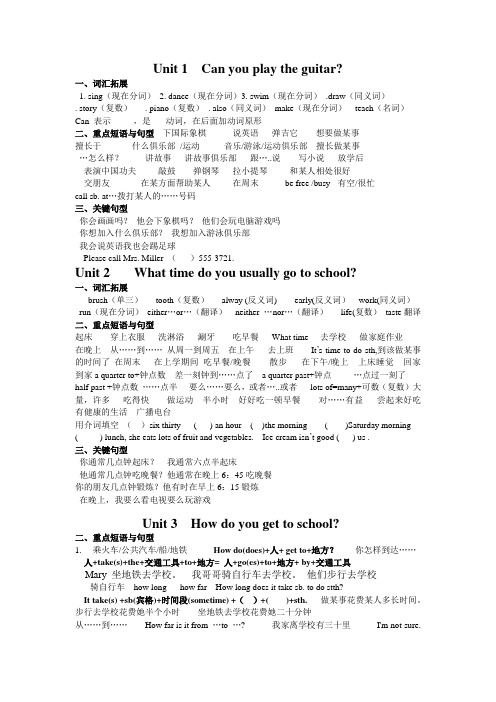
Unit 1 Can you play the guitar?一、词汇拓展1. sing(现在分词)2. dance(现在分词)3. swim(现在分词).draw(同义词). story(复数). piano(复数). also(同义词)make(现在分词)teach(名词)Can 表示- ------,是-----动词,在后面加动词原形二、重点短语与句型下国际象棋说英语弹吉它想要做某事擅长于什么俱乐部/运动音乐/游泳/运动俱乐部擅长做某事…怎么样?讲故事讲故事俱乐部跟…..说写小说放学后表演中国功夫敲鼓弹钢琴拉小提琴和某人相处很好交朋友在某方面帮助某人在周末be free /busy 有空/很忙call sb. at…拨打某人的……号码三、关键句型你会画画吗?他会下象棋吗?他们会玩电脑游戏吗你想加入什么俱乐部?我想加入游泳俱乐部我会说英语我也会踢足球Please call Mrs. Miller ()555-3721.Unit 2 What time do you usually go to school?一、词汇拓展brush(单三)tooth(复数)alway (反义词) early(反义词)work(同义词)run(现在分词)either…or…(翻译)neither …nor…(翻译)life(复数)taste翻译二、重点短语与句型起床穿上衣服洗淋浴涮牙吃早餐What time 去学校做家庭作业在晚上从……到……从周一到周五在上午去上班It’s time to do sth,到该做某事的时间了在周末在上学期间吃早餐/晚餐散步在下午/晚上上床睡觉回家到家a quarter to+钟点数差一刻钟到……点了 a quarter past+钟点…点过一刻了half past +钟点数……点半要么……要么,或者…..或者lots of=many+可数(复数)大量,许多吃得快做运动半小时好好吃一顿早餐对……有益尝起来好吃有健康的生活广播电台用介词填空()six thirty ( ) an hour ( )the morning ( )Saturday morning ( ) lunch, she eats lots of fruit and vegetables. Ice cream isn’t good ( ) us .三、关键句型你通常几点钟起床?我通常六点半起床他通常几点钟吃晚餐?他通常在晚上6:45吃晚餐你的朋友几点钟锻炼?他有时在早上6:15锻炼在晚上,我要么看电视要么玩游戏Unit 3 How do you get to school?二、重点短语与句型1. 乘火车/公共汽车/船/地铁How do(does)+人+ get to+地方?你怎样到达……人+take(s)+the+交通工具+to+地方= 人+go(es)+to+地方+ by+交通工具Mary 坐地铁去学校。
七年级下册英语单词unit3

七年级下册英语单词unit3Unit3 How do you get to school (你怎么去上学)1.train [treɪn] n. 火车2.bus [bʌs] n. 公交车3.subway ['sʌbweɪ] n. 地铁4.ride [raɪd] v. 骑n. 旅行5.bike [baɪk] n. 自行车6.sixty ['sɪksti]num. 六十7.seventy ['sevnti] num. 七十8.eighty ['eɪti]num. 八十9.ninety ['naɪnti]num. 九十10.hundred ['hʌndrəd] num. 一百11.minute ['mɪnɪt] n. 分钟12.kilometer ['kɪləˌmiːtə] n. 公里13.new [njuː] adj. 新的;刚出现的14.every ['evri] adj. 每一;每个15.far [fɑː(r)] adv. & adj. 远;远的16.by [baɪ] prep.(表示方式)乘(交通工具)17.drive [draɪv]v. 开车18.car [kɑː(r)] n. 小汽车;轿车19.live [lɪv] v.居住;生活20.stop [stɒp] n. 车站;停止21.cross [krɒs] v. 横过;越过22.river ['rɪvə(r)] n. 河;江23.many ['meni] adj. & pron. 许多24.village ['vɪlɪdʒ] n. 村庄;村镇25.between [bɪ'twiːn] prep. 介于......之间26.bridge [brɪdʒ] n. 桥27.boat [bəʊt] n. 小船28.Ropeway ['rəʊpweɪ] n. 索道29.year [jɪə(r)] n. 年;岁30.afraid [ə'freɪd] adj. 害怕;惧怕31.like [laɪk] prep. 像;怎么样32.leave [liːv] v. 离开33.dream [driːm] n. 梦想;睡梦v. 做梦34.true [truː] adj. 真的;符合事实的35.take the subway 乘地铁36.ride a bike 骑自行车37.every day 每天38. by bike 骑自行车39.think of 认为40.between...and... 在......和......之间e true实现;成为现实42.Dave戴夫(男名)。
牛津译林版英语七年级下册Unit3知识点精讲(下)

U3基础知识梳理(下)面对这种情景,我们情何以堪?我们能为阻止这些事情做些什么?一、词汇Words1. postcard n明信片.(1)postcard用作名词,表示“明信片”之意,可数,其复数形式是.例:我请他寄一张明信片给那位交流生。
在这样的环境中,我们可以环境污染在这样的环境中,我们。
1 / 122. key n 钥匙,答案,键,关键key用作名词,意为“钥匙;答案;关键”,其复数形式是。
(1)key表示“钥匙”之意时,常用“这个门的钥匙”固定搭配。
例:我没有前门的钥匙。
(2)key表示“答案”之意时,常用“这个问题答案”固定搭配。
例:我知道第一个问题的答案。
(3)key 表示“键”之意时,是指电脑、打字机、钢琴等“键盘上”的“键”。
例:这个键盘上有六排键。
(4)key 也可以用作名词,表示“关键”性的人或人事。
例:那个人可能是这个学校的关键人物。
3.ring n 环,圈;戒指(1)ring用作名词,表示“环;圈;戒指”,是可数名词,其复数形式是例:桌子上的指环不是我的。
(2)ring例:他经常星期天给我打电话。
4.all over 到处,遍及(1)all over 表示“到处”之意时,与副词everywhere 意义接近。
例:孩子们全身都湿透了。
(2)all over 表示“遍及”之意时,相当于介词throughout ,后面要接名词、代词等作宾语:“全世界”.例:全中国已经发生了巨大的变化。
全世界的儿童都喜欢看电视。
(all over)________________________________________________5.raise vt 饲养,使升高(1)raise ,及物动词,表示“饲养”,后接“饲养”的动物名称。
例:妈妈养了很多猪。
(2)raise ,及物动词,也可表示“使升高”,后接“使升高”的人、物等。
例:最后他提高了声音。
批注:[辨析] rise, raiserise(rose, risen)vi. 上升,升起, 升高;上涨;站起来。
Unit3词汇精讲及短语人教版七年级英语下册

1.get to 到达例句:你怎么到学校?(G7下,U3,P13) How do you get to school?【注意】:当地点是副词home/here/there等时,to要省略。
例句:到家要多久?(G7下,U3,P15) How long does it take to get home?【扩展】:get to= arrive in/at或reach arrive at+小地点arrive in +大地点reach +地点(及物动词直接接地点)2.train/trem/cn.火车------复数trains短语:go to...by train=go to... on a/the train= take a/ the train to ...乘火车去……例句:你怎么去学校?How do you go to school?I take the train the school.=I go to school by train/ on the train3.bus Cn.公共汽车--------复数buses短语:go to...by bus=go to... on a/the bus= take a/ the bus to ...乘公交车去……例句:他坐公交车上班。
He takes the bus to work=He goes to work by bus/on the bus.例句:你的朋友们坐公交车上学吗?Do your friends go to school by bus?4. subway Cn. 地铁------复数subways例句:我骑自行车去地铁站。
短语:go to...by subway=go to... on the subwaytake the subway to...乘地铁去......例句:我们乘地铁去公园we take the subway to the park.=we go to the park by subway/on the subway.5.ride vt.骑cn.旅程------过去式rode 单三形式rides-----现在分词riding 骑手(cn.) rider短语:ride a /the /one’s bike(s) to== go to …by bike=go to… on a /the bike 骑直行车去……骑马ride a horse ==go ridingI ride my bike to school every morning .6.bike/bak/cn.自行车-----复数bikes短语:ride a bike 例句:你是走路还是骑自行车呢?Do you walk or ride a bike?7.sixty num.六十-----复数sixties ----序数词sixtieth8. Seventy num. 七十-----复数seventies -----序数词seventieth 9. eighty num.八十-----复数eighties -----序数词eightieth 10. ninety num. 九十----复数nineties----- 序数词ninetieth 11. hundred /'h ndr d/num. 一百【注意】:hundred 前有数字时,hundred 不用复数,直接接可数名词复数,也不与of 连例句:2000名学生在这个学校There are 2000 students in the school.【注意】表示一个不确定数时,前面没有具体数字,其后加s ,与of 连用。
人教版新目标七年级英语下册Unit3说课稿
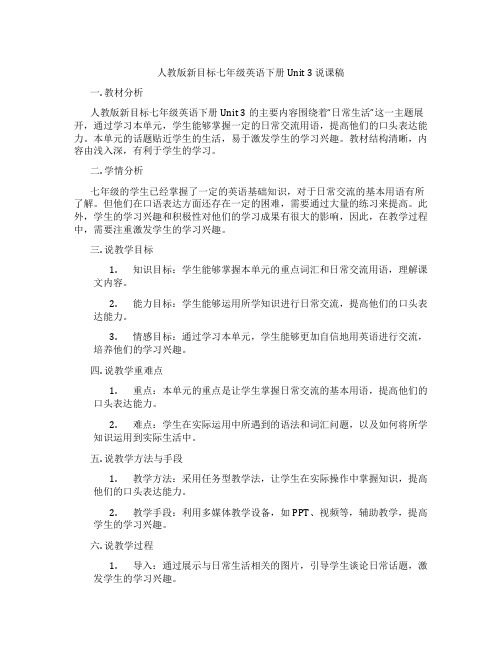
人教版新目标七年级英语下册 Unit 3 说课稿一. 教材分析人教版新目标七年级英语下册Unit 3的主要内容围绕着“日常生活”这一主题展开,通过学习本单元,学生能够掌握一定的日常交流用语,提高他们的口头表达能力。
本单元的话题贴近学生的生活,易于激发学生的学习兴趣。
教材结构清晰,内容由浅入深,有利于学生的学习。
二. 学情分析七年级的学生已经掌握了一定的英语基础知识,对于日常交流的基本用语有所了解。
但他们在口语表达方面还存在一定的困难,需要通过大量的练习来提高。
此外,学生的学习兴趣和积极性对他们的学习成果有很大的影响,因此,在教学过程中,需要注重激发学生的学习兴趣。
三. 说教学目标1.知识目标:学生能够掌握本单元的重点词汇和日常交流用语,理解课文内容。
2.能力目标:学生能够运用所学知识进行日常交流,提高他们的口头表达能力。
3.情感目标:通过学习本单元,学生能够更加自信地用英语进行交流,培养他们的学习兴趣。
四. 说教学重难点1.重点:本单元的重点是让学生掌握日常交流的基本用语,提高他们的口头表达能力。
2.难点:学生在实际运用中所遇到的语法和词汇问题,以及如何将所学知识运用到实际生活中。
五. 说教学方法与手段1.教学方法:采用任务型教学法,让学生在实际操作中掌握知识,提高他们的口头表达能力。
2.教学手段:利用多媒体教学设备,如PPT、视频等,辅助教学,提高学生的学习兴趣。
六. 说教学过程1.导入:通过展示与日常生活相关的图片,引导学生谈论日常话题,激发学生的学习兴趣。
2.新课呈现:讲解本节课的重点词汇和日常交流用语,让学生进行实际操作,如角色扮演等。
3.课堂练习:设计一些日常交流的场景,让学生进行实际运用,巩固所学知识。
4.课堂小结:对本节课的内容进行总结,让学生明确学习目标。
5.课后作业:布置一些与日常生活相关的任务,让学生课后进行练习,提高他们的口头表达能力。
七. 说板书设计板书设计要清晰、简洁,能够突出本节课的重点内容。
2013春新人教版七年级英语下册全课文翻译小字版
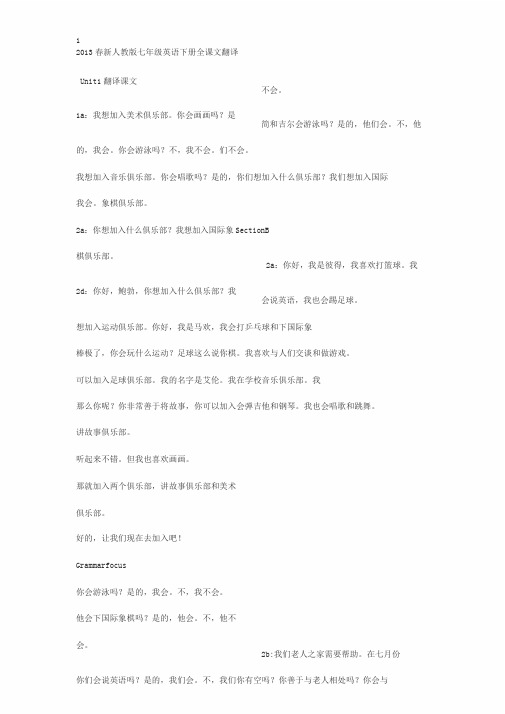
12013春新人教版七年级英语下册全课文翻译Unit1翻译课文不会。
1a:我想加入美术俱乐部。
你会画画吗?是简和吉尔会游泳吗?是的,他们会。
不,他的,我会。
你会游泳吗?不,我不会。
们不会。
我想加入音乐俱乐部。
你会唱歌吗?是的,你们想加入什么俱乐部?我们想加入国际我会。
象棋俱乐部。
2a:你想加入什么俱乐部?我想加入国际象SectionB棋俱乐部。
2a:你好,我是彼得,我喜欢打篮球。
我2d:你好,鲍勃,你想加入什么俱乐部?我会说英语,我也会踢足球。
想加入运动俱乐部。
你好,我是马欢,我会打乒乓球和下国际象棒极了,你会玩什么运动?足球这么说你棋。
我喜欢与人们交谈和做游戏。
可以加入足球俱乐部。
我的名字是艾伦。
我在学校音乐俱乐部。
我那么你呢?你非常善于将故事,你可以加入会弹吉他和钢琴。
我也会唱歌和跳舞。
讲故事俱乐部。
听起来不错。
但我也喜欢画画。
那就加入两个俱乐部,讲故事俱乐部和美术俱乐部。
好的,让我们现在去加入吧!Grammarfocus你会游泳吗?是的,我会。
不,我不会。
他会下国际象棋吗?是的,他会。
不,他不会。
2b:我们老人之家需要帮助。
在七月份你们会说英语吗?是的,我们会。
不,我们你有空吗?你善于与老人相处吗?你会与2013春新人教版版七年级英语下册全课文翻译22013春新人教版七年级英语下册全课文翻译他们说话做游戏吗?他们会给你讲故事,你上班?在十一点,所以的工作从不迟到。
们可以交朋友。
它既有趣又好玩!请在今Grammarfocus天拨打电话698-7759与我们联系。
你通常几点起床?我通常六点三十起床。
放学后你忙吗?不忙?你会说英语你们几点穿衣服?他们总是在七点二十穿吗?是吗?那么,我们需要你帮助说英语的衣服。
学生做运动。
这事轻松的,容易的!请来学里克几点吃早饭?他七点吃早饭。
生运动中心吧。
拨打电话293-7742联系布朗斯科特什么时候去工作?他总是在十一点先生。
去工作,他从不迟到。
你会弹钢琴或者拉小提琴吗?在周末你的朋友们什么时候锻炼?他们通常在周你有时间吗?学校需要帮助教音乐。
七年级下英语1-3单元知识点大归纳
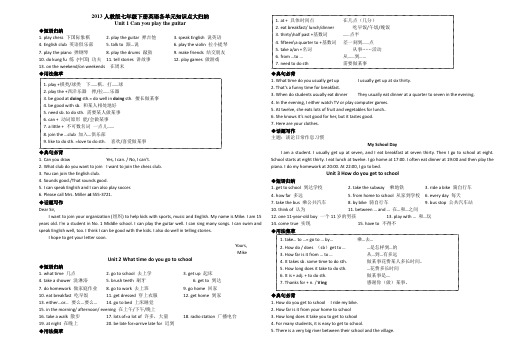
2013人教版七年级下册英语各单元知识点大归纳Unit 1 Can you play the guitar◆短语归纳1. play chess 下国际象棋2. play the guitar 弹吉他3. speak English 说英语4. English club 英语俱乐部5. talk to 跟…说6. play the violin 拉小提琴7. play the piano 弹钢琴8. play the drums 敲鼓9. make friends 结交朋友 10. do kung fu 练 (中国) 功夫 11. tell stories 讲故事 12. play games 做游戏 13. on the weekend/on weekends 在周末 ◆用法集萃◆典句必背1. Can you draw Yes, I can. / No, I can’t.2. What club do you want to join I want to join the chess club.3. You can join the English club.4. Sounds good./That sounds good.5. I can speak English and I can also play soccer.6. Please call Mrs. Miller at 555-3721. ◆话题写作 Dear Sir,I want to join your organization (组织) to help kids with sports, music and English. My name is Mike. I am 15 years old. I’m a student in No. 1 Middle school. I can play the guitar well. I can sing many songs. I can swim and speak English well, too. I think I can be good with the kids. I also do well in telling stories.I hope to get your letter soon.Yours, MikeUnit 2 What time do you go to school◆短语归纳1. what time 几点2. go to school 去上学3. get up 起床4. take a shower 洗淋浴5. brush teeth 刷牙6. get to 到达7. do homework 做家庭作业8. go to work 去上班9. go home 回家 10. eat breakfast 吃早饭 11. get dressed 穿上衣服 12. get home 到家13. either…or… 要么…要么… 14. go to bed 上床睡觉 15. in the morning/ afternoon/ evening 在上午/下午/晚上 16. take a walk 散步 17. lots of=a lot of 许多,大量 18. radio station 广播电台19. at night 在晚上 20. be late for=arrive late for 迟到 ◆用法集萃◆典句必背1. What time do you usually get up I usually get up at six thirty.2. That’s a funny time for breakfast.3. When do students usually eat dinner They usually eat dinner at a quarter to seven in the evening.4. In the evening, I either watch TV or play computer games.5. At twelve, she eats lots of fruit and vegetables for lunch..6. She knows it’s not good for her, but it tas tes good.7. Here are your clothes. ◆话题写作主题:谈论日常作息习惯My School DayI am a student. I usually get up at seven, and I eat breakfast at seven thirty. Then I go to school at eight. School starts at eight thirty. I eat lunch at twelve. I go home at 17:00. I often eat dinner at 19:00 and then play the piano. I do my homework at 20:00. At 22:00, I go to bed.Unit 3 How do you get to school◆短语归纳1. get to school 到达学校2. take the subway 乘地铁3. ride a bike 骑自行车4. how far 多远5. from home to school 从家到学校6. every day 每天7. take the bus 乘公共汽车8. by bike 骑自行车9. bus stop 公共汽车站10. think of 认为 11. between … and … 在…和…之间 12. one 11-year-old boy 一个11岁的男孩 13. play with … 和…玩 14. come true 实现 15. have to 不得不 ◆用法集萃 ◆典句必背1. How do you get to school I ride my bike.2. How far is it from your home to school3. How long does it take you to get to school4. For many students, it is easy to get to school.5. There is a very big river between their school and the village.1. play +棋类/球类 下……棋,打……球2. play the +西洋乐器 弹/拉……乐器3. be good at doing sth.= do well in doing sth. 擅长做某事4. be good with sb. 和某人相处地好5. need sb. to do sth. 需要某人做某事6. can + 动词原形 能/会做某事7. a little + 不可数名词 一点儿……8. join the …club 加入…俱乐部9. like to do sth. =love to do sth. 喜欢/喜爱做某事1. take… to …= go to … by… 乘…去…2. How do / does (sb )get to … …是怎样到…的3. How far is it from … to … 从…到…有多远4. It takes sb. some time to do sth. 做某事花费某人多长时间。
牛津译林版初中英语七年级英语下册Unit3学案及习题【含答案】
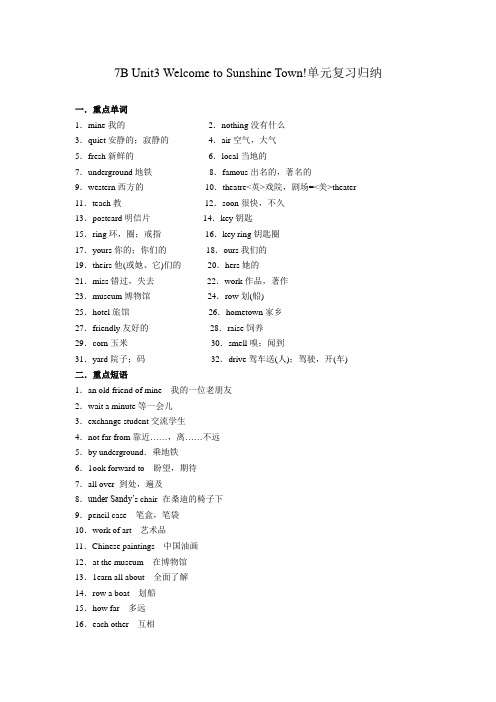
7B Unit3 Welcome to Sunshine Town!单元复习归纳一.重点单词1.mine我的2.nothing没有什么3.quiet安静的;寂静的4.air空气,大气5.fresh新鲜的6.local当地的7.underground地铁8.famous出名的,著名的9.western西方的10.theatre<英>戏院,剧场=<美>theater 11.teach教12.soon很快,不久13.postcard明信片14.key钥匙15.ring环,圈;戒指16.key ring钥匙圈17.yours你的;你们的18.ours我们的19.theirs他(或她、它)们的20.hers她的21.miss错过,失去22.work作品,著作23.museum博物馆24.row划(船)25.hotel旅馆26.hometown家乡27.friendly友好的28.raise饲养29.corn玉米30.smell嗅;闻到31.yard院子;码32.drive驾车送(人);驾驶,开(车)二.重点短语1.an old friend of mine 我的一位老朋友2.wait a minute等一会儿3.exchange student交流学生4.not far from靠近……,离……不远5.by underground.乘地铁6.1ook forward to 盼望,期待7.all over 到处,遍及8.under Sandy’s chair 在桑迪的椅子下9.pencil case 笔盒,笔袋10.work of art 艺术品11.Chinese paintings 中国油画12.at the museum 在博物馆13.1earn all about 全面了解14.row a boat 划船15.how far 多远16.each other 互相17.go shopping 去购物18.on a farm 在农场19.hear the birds sing 听到鸟儿歌唱20.raise cows 养牛21.show sb.Around 带领某人参观22.a wonderful place to live 一个居住的好地方三.重点句子及点拨1.An old friend of mine is coming to see me,Hobo.霍波,我的一位老朋友要来看我。
- 1、下载文档前请自行甄别文档内容的完整性,平台不提供额外的编辑、内容补充、找答案等附加服务。
- 2、"仅部分预览"的文档,不可在线预览部分如存在完整性等问题,可反馈申请退款(可完整预览的文档不适用该条件!)。
- 3、如文档侵犯您的权益,请联系客服反馈,我们会尽快为您处理(人工客服工作时间:9:00-18:30)。
How does your friend go to the park? How far is it from home to the park?
How long does it take?
She takes a boat. It’s about 4 kilometers. It takes 30 minutes by bike.
1.How do you get to school? I walk. 2.How long does it take to get to school? It takes 5 minutes. 3.How far is it from your home to school? It is two kilometers. 4.Do you walk to school? Yes , I do. 5.Do your friends ride their bikes to school? No , they don’t.
• • • • • • • • • •
Explanation
1. It + takes sb + some time + to do sth 做某事花了某人多少时间。如: e 做作业花了我半天时间。 It takes me half a day to do my homework. 2. 表花费的词还有:pay, spend, cost 等。 1) sb + pay + 金钱 + for + 物 表示某人花钱买某物。 她花50元买这本字典。 She pays 50 yuan for the dictionary. spent 150 yuan on the skirt.
• • 3)表示“乘坐某种交通工具”还可以用“on / in + 限定词 + 表示交通工具的名词”。 • 她经常乘校车去上学。 • She often goes to school on the school bus. • 他有时坐爸爸的汽车去上学。 • He sometimes goes to school in his father’s car. •
1.How does Mike get to school? 2.How long does it take to get home? 3.How far is it from here? 4. Do your friends go to school by bus? 5. Does your dad drive his car to work?
Unit3
Section A 3a—3c
How does Tom get to school? How far is it from home to school? How long does it take?
He takes the bus. It’s about 2 kilometers. It takes 25 minutes to walk.
Explanation
• 2) sb + spend +时间/金钱 (in) doing sth. • 他玩了两小时电子游戏。 • He spent two hours (in) playing computer games. • 3) sb + spend +时间/金钱 on sth. • 她买那条裙子花了150元。 • She spent 150 yuan on the skirt. • 4)Sth +cost +金钱 • 这本书花了我两美元 • The book costs me two dollars.
(就画线部分提问)
• 5. I live 10 miles from school.
How far do you live from school? • _____ _____
考考你 1. She often goes to work by bus. (划线提问) 2. It takes him an hour to get home. (英译汉) 3. We usually walk to school. (变同义句) 4. Mr. green always take the subway to office.(变为一般疑问句) 5. 完成这项工作花了他两天的时间。 (汉译英)
•
How far 3. --______ _____is it from your home?
--It’s about 2 kilometers.
• 4. Tom takes the train to school. • • • (就画线部分提问)
How _________ does Tom get to school?
a. Yes ,they do.
b. No, he doesn’t . c. He rides his bike. d. It’s five kilometers.
e. About 15 minutes.
e these words to make questions. Then ask and answer them with your partner.
How does he get to school?
He rides his bike to school.
=He gets to school on his bike.
=He gets to school by bike.
3a.Match the questions with the answers . Then practice them.
Ⅱ. 填空
•
•
1.– Mary, _______ do you get to school? how
--I usually ride my bike.
•
•
2.How long --_______ _______ does it take?
-- It takes about 15 minutes.
•
• 3. by bus, ride my bike 和 take the subway均表 示“乘坐某种交通工具”。 • 1) “by + 表示交通工具的单数名词”在句中作 方式状语, 名词前不需加任何限定词。 • 我姐姐乘船去上班。 • My sister goes to work by boat . • 2) “ride / take + 限定词 + 表示交通工具的名词” 在句中作谓语。 • 她乘公共汽车去上学。 • She rides the bus to school . •
Ⅰ. 词汇
• • • • • • • •
walk 1. My home is near. I ______(步行)to school. takes 2. Li Lei ______ the subway (乘地铁)to school. 3. plane byHis father often goes to Shanghai ____ ______(坐飞机). takeyou taxi want to be late, you'd better 4. If the bike don't Riding ______ a _____(打的). 5. _______ ____ _____ (骑自行车)to work is good for our he
